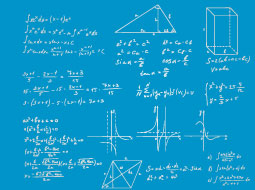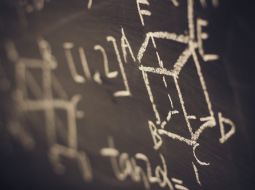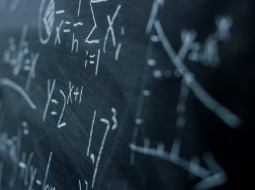Online courses directory (418)
<p>This free online Geometry course provides a comprehensive introduction to geometrical methods and techniques, covering angles, triangles, quadrilaterals, polygons, and more. </p><br /> <p>It is ideal for complementing face-to-face classes, as a study guide, or for those who would like to refresh their knowledge of mathematics. </p>
Geometry of Manifolds analyzes topics such as the differentiable manifolds and vector fields and forms. It also makes an introduction to Lie groups, the de Rham theorem, and Riemannian manifolds.
This course serves as an introduction to major topics of modern enumerative and algebraic combinatorics with emphasis on partition identities, young tableaux bijections, spanning trees in graphs, and random generation of combinatorial objects. There is some discussion of various applications and connections to other fields.
6.844 is a graduate introduction to programming theory, logic of programming, and computability, with the programming language Scheme used to crystallize computability constructions and as an object of study itself. Topics covered include: programming and computability theory based on a term-rewriting, "substitution" model of computation by Scheme programs with side-effects; computation as algebraic manipulation: Scheme evaluation as algebraic manipulation and term rewriting theory; paradoxes from self-application and introduction to formal programming semantics; undecidability of the Halting Problem for Scheme; properties of recursively enumerable sets, leading to Incompleteness Theorems for Scheme equivalences; logic for program specification and verification; and Hilbert's Tenth Problem.
Double affine Hecke algebras (DAHA), also called Cherednik algebras, and their representations appear in many contexts: integrable systems (Calogero-Moser and Ruijsenaars models), algebraic geometry (Hilbert schemes), orthogonal polynomials, Lie theory, quantum groups, etc. In this course we will review the basic theory of DAHA and their representations, emphasizing their connections with other subjects and open problems.
This course offers an advanced introduction to numerical linear algebra. Topics include direct and iterative methods for linear systems, eigenvalue decompositions and QR/SVD factorizations, stability and accuracy of numerical algorithms, the IEEE floating point standard, sparse and structured matrices, preconditioning, linear algebra software. Problem sets require some knowledge of MATLAB®.
This course offers a rigorous treatment of linear algebra, including vector spaces, systems of linear equations, bases, linear independence, matrices, determinants, eigenvalues, inner products, quadratic forms, and canonical forms of matrices. Compared with 18.06 Linear Algebra, more emphasis is placed on theory and proofs.
This is a second-semester graduate course on the geometry of manifolds. The main emphasis is on the geometry of symplectic manifolds, but the material also includes long digressions into complex geometry and the geometry of 4-manifolds, with special emphasis on topological considerations.
This course introduces topology, covering topics fundamental to modern analysis and geometry. It also deals with subjects like topological spaces and continuous functions, connectedness, compactness, separation axioms, and selected further topics such as function spaces, metrization theorems, embedding theorems and the fundamental group.
In this course, students take turns in giving lectures. For the most part, the lectures are based on Robert Osserman's classic book A Survey of Minimal Surfaces, Dover Phoenix Editions. New York: Dover Publications, May 1, 2002. ISBN: 0486495140.
This free online course is the second of our Upper-Secondary Mathematics suite of courses. It covers ratio and proportion, geometric sequences, arithmetic series, difference equations, linear programming, geometry, trigonometry, and graphs. This course is suitable for all math students revising for exams. It is also suitable for anyone with an interest in Mathematics. <br />
This course covers matrix theory and linear algebra, emphasizing topics useful in other disciplines such as physics, economics and social sciences, natural sciences, and engineering. It parallels the combination of theory and applications in Professor Strang’s textbook Introduction to Linear Algebra.
Course Format
 This course has been designed for independent study. It provides everything you will need to understand the concepts covered in the course. The materials include:
This course has been designed for independent study. It provides everything you will need to understand the concepts covered in the course. The materials include:
- A complete set of Lecture Videos by Professor Gilbert Strang.
- Summary Notes for all videos along with suggested readings in Prof. Strang's textbook Linear Algebra.
- Problem Solving Videos on every topic taught by an experienced MIT Recitation Instructor.
- Problem Sets to do on your own with Solutions to check your answers against when you're done.
- A selection of Java® Demonstrations to illustrate key concepts.
- A full set of Exams with Solutions, including review material to help you prepare.
Other Versions
Other OCW Versions
OCW has published multiple versions of this subject. ![]()
Related Content
This is a communication intensive supplement to Linear Algebra (18.06). The main emphasis is on the methods of creating rigorous and elegant proofs and presenting them clearly in writing. The course starts with the standard linear algebra syllabus and eventually develops the techniques to approach a more advanced topic: abstract root systems in a Euclidean space.
Math 101: College Algebra is designed to be used to prepare you to earn real college credit by passing the College Algebra CLEP Exam . This course covers topics that are included on the exam, including linear equations, functions, graphing, matrices and more. Use it to help you learn what you need to know about algebra topics so you can succeed on the exam.
The algebra instructors are experienced and knowledgeable educators who have put together comprehensive video lessons in categories ranging from absolute value problems to exponentials to the classification of numbers. Each category is broken down into smaller chapters that will cover topics more in-depth. These video lessons make learning fun and interesting. You get the aid of self-graded quizzes and practice tests to allow you to gauge how much you have learned.
This course will focus on various aspects of mirror symmetry. It is aimed at students who already have some basic knowledge in symplectic and complex geometry (18.966, or equivalent). The geometric concepts needed to formulate various mathematical versions of mirror symmetry will be introduced along the way, in variable levels of detail and rigor.
Lectures by Prof. S.K.RayrnDepartment of Mathematics and StatisticsrnIIT Kanpur
Lecture Series on Mathematics - III by Prof.P.N.Agarwal, Department of Mathematics, IIT Roorkee.
This intermediate math course continues our free online maths suite of courses. It covers rules and applications of differentiation, straight line graphs, graphing circular functions, logs and indices, the Binomial theorem, inverse functions, and factors of polynomials. This course is ideal for second-level students, anyone studying for an exam, and those interested in re-igniting their knowledge of mathematics!<br />
Find out what solid-state physics has brought to Electromagnetism in the last 20 years. This course surveys the physics and mathematics of nanophotonics—electromagnetic waves in media structured on the scale of the wavelength.
Topics include computational methods combined with high-level algebraic techniques borrowed from solid-state quantum mechanics: linear algebra and eigensystems, group theory, Bloch's theorem and conservation laws, perturbation methods, and coupled-mode theories, to understand surprising optical phenomena from band gaps to slow light to nonlinear filters.
Note: An earlier version of this course was published on OCW as 18.325 Topics in Applied Mathematics: Mathematical Methods in Nanophotonics, Fall 2005.
Trusted paper writing service WriteMyPaper.Today will write the papers of any difficulty.






















